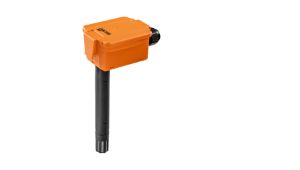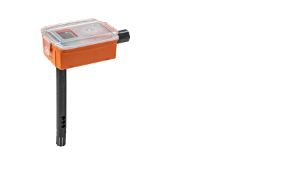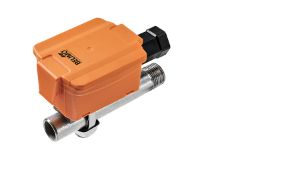

Humidity sensors
Advanced humidity sensors for HVAC systems
Monitoring air humidity is essential for ensuring optimal comfort in a building and protecting the building infrastructure, production processes, stored goods, and works of art. Our product range of long-term stable humidity sensors for rooms, ducts, outdoor air, and condensation enables energy-optimised operation and ensures compatibility with all major building automation systems. High-quality and reliable sensors guarantee the accuracy and reproducibility of measurements. Combined sensors for temperature and humidity provide a flexible and cost-saving application.
Features
- Multisensor with selectable output measurement values: relative humidity, absolute humidity, enthalpy, and dew point.
- The choice of up to four different temperature ranges ensure best fit of product.
Innovation for peace of mind
Product range
Duct humidity sensors
Installed within air ducts to monitor relative humidity and optimise ventilation control.
Pipe humidity sensors
Detect condensation and moisture presence in piping systems to prevent corrosion and inefficiencies.
Room humidity sensors
Measure indoor humidity levels to maintain comfortable and healthy environments.
Product range
Outdoor humidity sensors
Provide accurate ambient humidity data to support HVAC system adjustments based on external conditions.
Optimise HVAC efficiency with high-performance humidity sensors
Humidity sensors are essential in HVAC systems for monitoring and controlling humidity levels in indoor and outdoor environments. These sensors provide real-time humidity measurements, allowing HVAC systems to adjust ventilation, dehumidification, and humidification processes accordingly. Proper humidity control enhances indoor air quality, prevents mould growth, and improves overall system efficiency.
Key benefits of Belimo HVAC humidity sensors
Integrating high-precision humidity sensors in HVAC applications offers numerous advantages:
-
Helps control humidity levels to prevent mould, bacteria, and airborne contaminants.
-
Optimises dehumidification and humidification processes, reducing unnecessary energy use.
-
Maintains ideal humidity levels to prevent dryness or excessive dampness.
-
Prevents condensation-related damage to HVAC components and building structures, enhancing their longevity.
-
BACnet and Modbus communication protocols provide superior application data access and enable easy commissioning and configuration.
Applications of HVAC humidity sensors
HVAC humidity sensors are widely used in various industries and environments, including:
-
Ensuring optimal relative humidity control in offices, hotels, and retail spaces.
-
Maintaining humidity levels in production areas where humidity-sensitive materials are handled.
-
Providing precise humidity control in hospitals and research environments to ensure patient health and safety.
-
Preventing excessive humidity that can lead to equipment failures and electrical issues.
Selecting the right humidity sensor for HVAC systems
When choosing a humidity sensor for a HVAC application, consider the following factors:
-
Selecting the appropriate sensor for ducts, pipes, rooms, or outdoor environments.
-
Analogue (0...10 V, 4...20 mA) or digital (Modbus, BACnet) outputs for easy integration.
-
Robust housing with high IP ratings to withstand humidity, dust, and extreme temperatures.
-
Fast and stable response to humidity fluctuations ensures optimal HVAC control.










